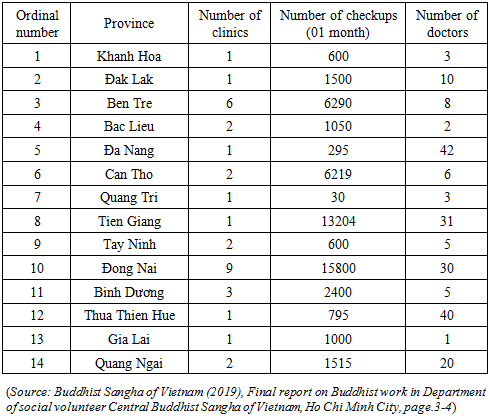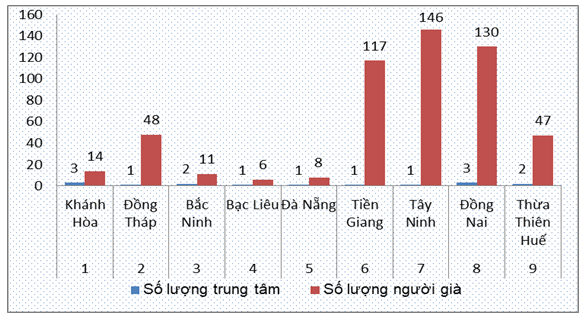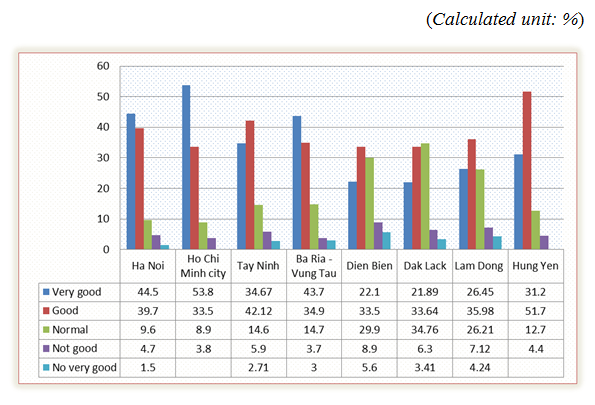-
Paper Information
- Paper Submission
-
Journal Information
- About This Journal
- Editorial Board
- Current Issue
- Archive
- Author Guidelines
- Contact Us
American Journal of Sociological Research
p-ISSN: 2166-5443 e-ISSN: 2166-5451
2020; 10(1): 1-11
doi:10.5923/j.sociology.20201001.01

Security Activity of Vietnam Buddhist Association from 1981 to the Present
Duong Quang Dien1, Nguyen Van Tuan2, Quach Thi Kieu3
1Dr, Deputy General Secretary, Chief of the Central Office of Vietnamese Buddhist Association, Hanoi, Vietnam
2Dr, People’s security Academy, Hanoi, Vietnam
3M.s, Department of Labour-Invalids and Social Affairs, Hoa Binh, Vietnam
Correspondence to: Nguyen Van Tuan, Dr, People’s security Academy, Hanoi, Vietnam.
| Email: |  |
Copyright © 2020 The Author(s). Published by Scientific & Academic Publishing.
This work is licensed under the Creative Commons Attribution International License (CC BY).
http://creativecommons.org/licenses/by/4.0/

For nearly 40 years of establishment (in 1981), the Vietnamese Buddhist Association has practiced the spirit of compassion and relief in order to bring a prosperous, peaceful and happy life to the people. This secular activity is the activity of ensuring social security to help people overcome the difficulties they are facing in their daily life. This is also the motivation, the initial basis to help a large number of disadvantaged people in society to assert themselves and their families in life, contributing to building a better and more sustainable society. In recent years, this activity has been strongly and widely implemented towards disadvantaged people in society. Therefore, in this paper, on the basis of clarifying the importance of the Vietnamese Buddhist Association in ensuring social security for the people over the past time, the authors assessed the situation and drew some experience from social security activities of Vietnamese Buddhist Association for people from 1981 to the present.
Keywords: Social security, Vietnamese Buddhist Association, Experience, Vietnam, 1981
Cite this paper: Duong Quang Dien, Nguyen Van Tuan, Quach Thi Kieu, Security Activity of Vietnam Buddhist Association from 1981 to the Present, American Journal of Sociological Research, Vol. 10 No. 1, 2020, pp. 1-11. doi: 10.5923/j.sociology.20201001.01.
Article Outline
1. Introduction
- Social security activities for people has become a central issue in the sustainable development strategy of countries around the world in general and in Vietnam in particular. Along with the socio-economic development strategy, social security activities are always the primary concern to Vietnam in order to improve the material and spiritual life of the people. With this wish, from its establishment (in 1981), the Vietnamese Buddhist Association has always accompanied the country, carried out the renovation and international integration in the spirit of harmony, solidarity with the motto "Serving religion, patriotism". Many "secular" social security activities for people, especially the disadvantaged people in society, are always concerned, shared and implemented extensively by the Vietnamese Buddhist Association. Thereby express the spirit of "Benevolence, Mercy, Cheerfulness, Indifference" and the humanism and virtue "Compassionate mind" of Buddha's teachings. Social security activities have been responding to the thoughts and aspirations of monks, nuns and Buddhists in the country. Therefore, social security activities for people have created a vigorous movement, a source of encouragement for the national solidarity movement. The achievement of "human life" from social security activities for the people creates a material and spiritual motivation for the country's sustainable development, and contributes positively to the implementation of the Millennium Development Goals of the United Nations1.
2. Researh Method
- In recent years, in the world and in Vietnam, research on social security is attracting scientists and scholars to participate in research with many different approaches and methods. Because this is an important theoretical and practical activity to improve the people’s life quality and contributes to the sustainable development of each country and the world. As one of the important contents in the development direction of the Vietnamese Buddhist Association, social security activities of the Vietnamese Buddhist Association are interested in researching in many angles, contents and welfare pillars by the authors in recent years. In this article, the authors have used a number of research methods: analytical and synthetical method; logical - historical method with the purpose of clarifying the importance of the Vietnamese Buddhist Association in ensuring social security for people in Vietnam ...The paper is based on historical sources stored in libraries and volumes of prayer-books, research papers, highly reliable scientific conferences, summaries of disciplines related to social policy and social security policies, ... Based on that, the article goes in depth to analyze the typical activities of the Vietnamese Buddhist Association in general, the Buddhist Association in localities in particular about ensuring social security for people to provide scientific arguments to achieve the effect that the article requires.To assess the reality of the research issue, the authors conducted a survey based on the questionnaire survey method to extract practical information from monks, nuns and Buddhists in some localities throughout the country (Hanoi, Ho Chi Minh City; Lao Cai; Hung Yen; Dak Lak; Lam Dong; Thua Thien Hue; Bac Ninh; Tay Ninh) from 2015 to the present. These are localities with the active participation of the Vietnamese Buddhist Association. Data were collected based on the survey results of 300 monks, nuns and 1000 Buddhists living in the above areas. Information and data obtained after processing through a number of statistical software help the authors analyze and assess objectively the requirements and tasks set out in the article.Especially, in order to discuss the research results of the article in an objective and scientific manner, the authors have conducted using expert research methods (in-depth interviews, group discussions). At the same time, through these research methods, the authors have drawn some experiences from social security activities for Buddhists and people of the Vietnamese Buddhist Association after nearly 30 years of establishment. Specifically, the authors conducted in-depth interviews with a number of religious managers, religious experts and monks, nuns and Buddhists during the study.
3. Research Results
3.1. The Importance of the Vietnamese Buddhist Association in Social Security Activities for the People from the Time of Reunification (1981) to the Present
- Currently, there are many different approaches in the world about social security. Although approaching from many different perspectives, it shows that ensuring social security is the basis to contribute to ensuring income and life for citizens in society. Its mode of operation is through public measures. The goal is to create "well-being" or, more precisely, to ensure "human security" for all members of society.Ensuring social security is the use of tools and measures by the state and society to limit, overcome and assist members in society against risks in life and economic shocks, or due to causes of illness, maternity, labor accident, unemployment, injury, old age, natural disasters; at the same time, ensure medical care and allowances for poor families with many children. Social security is expressed through a system of policies such as hunger eradication, poverty reduction, sustainable poverty reduction, multi-dimensional poverty reduction, social insurance, health insurance, social assistance and incentives, etc [19].On the basis of the spirit of harmony, solidarity, serving religion and patriotism, inheritance of more than 2000 years of history and with the principle of "serving sentient beings as offerings to the Buddha" with practical activities, the Vietnamese Buddhist Association actively implement activities to ensure social security for people. The Association helps and encourages Buddhists and people to take an active part in the process of economic growth and development, and to overcome risks in the lives of people. Since then, creating social consensus, consolidating and improving the quality of social security. Therefore, promoting the role of the Vietnamese Buddhist Association in ensuring social security for people is a necessary and objective requirement, consistent with the direction set forth from the unification.
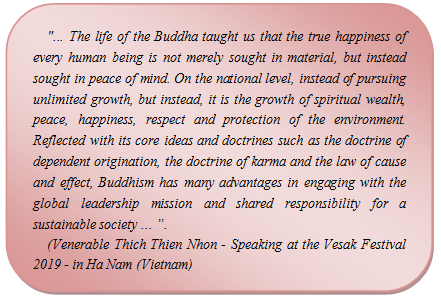 Through many practical activities, the Vietnamese Buddhist Association has aroused patriotism and national pride among Buddhists and the people; actively participate in movements of the Vietnam Fatherland Front at all levels in activities of building and strengthening the people's administration, taking care of and protecting the legitimate interests of the people. The Vietnamese Buddhist Association at all levels is always a bridge between the government, organizations and social unions with Buddhists and people; attracting a large number of Buddhists and people to participate in social work, improving the activeness of each Buddhist, people in solving complex issues of social reality. Thereby, the Vietnamese Buddhist Association at all levels contributes to creating and maintaining the spirit of solidarity and mutual affection among members of the society, which is the basis for creating community strength in ensuring the implementation of social security for people, contributing to the sustainable development of the country.In the spirit of appreciating the "entering the world", since the unification of sects to date, nearly 40 years of establishment, the Vietnamese Buddhist Association has always set the direction and measures for activities emanating from the legitimate interests and aspirations of Buddhists and the people; consistent with the country's development practices and the development's guidelines and policies of the country. The process of implementing the direction and measures on the Association's social security in practice has always received the support and assistance of a large number of Buddhists and the people. Therefore, the prestige and influence of Vietnamese Buddhism are increasingly affirmed on the map of Buddhism in the region and the world.In recent years, through various channels and forms, the Association has been actively propagating and disseminating Vietnam's guidelines, policies and laws on social security policies; coordinating with socio-political organizations at all levels to effectively organize the implementation of a number of basic pillars of social security policies: hunger eradication and poverty reduction; organize major campaigns nationwide, promoting the nation's compassionate tradition to help Buddhists and people facing many difficulties and risks in life; join and coordinate to participate in the movement "When drinking water, think of its source" in gratitude to heroes and families who have contributed to the country and the people; ... The practical activities launched and participated in by the Association are one of the important components to help Vietnam accelerate the guarantee of social security for people, proceed to successfully achieve the goals that Vietnam has set: Rich people, strong country, democratic society, justice and civilization.Social security policy is a system of policies, programs to prevent, reduce and overcome risks. In order to ensure the implementation of the system of policies and programs, it is based not only on the resources of the State, international resources, resources from enterprises in state and private sectors, but also the resources of the people. The Vietnamese Buddhist Association at all levels organized, raised the generosity and volunteerism from domestic and foreign enterprises and Buddhists to participate in social movements; to regularly study and renovate measures and methods of allocating financial sources from charity budget funds; to build complete mechanisms and ways to promptly encourage Buddhists and kind-hearted communities to contribute financial resources; to participate in managing and effectively using resources for social security assurance process.In addition, many monks, nuns and Buddhists are always actively involved in constructing and perfecting the guidelines and policies of Vietnam; participate in reviewing projects and policies of socio-economic development of the country and localities. The spirit of "truth and predestination" of the Buddha has gradually been "upholding the Dharma, giving advantage to the people". The activities of the Buddhist "ambassadors" also contribute to overcoming the negative and limitations in the process of implementing projects under each different pillar of social security in many localities.Thus, after nearly 40 years of establishment, social security activities for Buddhists and the people have significantly contributed to affirming the position and role of the Vietnamese Buddhist Association. Through specific activities of social security, the Association's prestige has been affirmed to the Government and people. At the same time, affirming Buddhism has been and will continue to accompany the people of Vietnam in the process of innovation, development and integration.
Through many practical activities, the Vietnamese Buddhist Association has aroused patriotism and national pride among Buddhists and the people; actively participate in movements of the Vietnam Fatherland Front at all levels in activities of building and strengthening the people's administration, taking care of and protecting the legitimate interests of the people. The Vietnamese Buddhist Association at all levels is always a bridge between the government, organizations and social unions with Buddhists and people; attracting a large number of Buddhists and people to participate in social work, improving the activeness of each Buddhist, people in solving complex issues of social reality. Thereby, the Vietnamese Buddhist Association at all levels contributes to creating and maintaining the spirit of solidarity and mutual affection among members of the society, which is the basis for creating community strength in ensuring the implementation of social security for people, contributing to the sustainable development of the country.In the spirit of appreciating the "entering the world", since the unification of sects to date, nearly 40 years of establishment, the Vietnamese Buddhist Association has always set the direction and measures for activities emanating from the legitimate interests and aspirations of Buddhists and the people; consistent with the country's development practices and the development's guidelines and policies of the country. The process of implementing the direction and measures on the Association's social security in practice has always received the support and assistance of a large number of Buddhists and the people. Therefore, the prestige and influence of Vietnamese Buddhism are increasingly affirmed on the map of Buddhism in the region and the world.In recent years, through various channels and forms, the Association has been actively propagating and disseminating Vietnam's guidelines, policies and laws on social security policies; coordinating with socio-political organizations at all levels to effectively organize the implementation of a number of basic pillars of social security policies: hunger eradication and poverty reduction; organize major campaigns nationwide, promoting the nation's compassionate tradition to help Buddhists and people facing many difficulties and risks in life; join and coordinate to participate in the movement "When drinking water, think of its source" in gratitude to heroes and families who have contributed to the country and the people; ... The practical activities launched and participated in by the Association are one of the important components to help Vietnam accelerate the guarantee of social security for people, proceed to successfully achieve the goals that Vietnam has set: Rich people, strong country, democratic society, justice and civilization.Social security policy is a system of policies, programs to prevent, reduce and overcome risks. In order to ensure the implementation of the system of policies and programs, it is based not only on the resources of the State, international resources, resources from enterprises in state and private sectors, but also the resources of the people. The Vietnamese Buddhist Association at all levels organized, raised the generosity and volunteerism from domestic and foreign enterprises and Buddhists to participate in social movements; to regularly study and renovate measures and methods of allocating financial sources from charity budget funds; to build complete mechanisms and ways to promptly encourage Buddhists and kind-hearted communities to contribute financial resources; to participate in managing and effectively using resources for social security assurance process.In addition, many monks, nuns and Buddhists are always actively involved in constructing and perfecting the guidelines and policies of Vietnam; participate in reviewing projects and policies of socio-economic development of the country and localities. The spirit of "truth and predestination" of the Buddha has gradually been "upholding the Dharma, giving advantage to the people". The activities of the Buddhist "ambassadors" also contribute to overcoming the negative and limitations in the process of implementing projects under each different pillar of social security in many localities.Thus, after nearly 40 years of establishment, social security activities for Buddhists and the people have significantly contributed to affirming the position and role of the Vietnamese Buddhist Association. Through specific activities of social security, the Association's prestige has been affirmed to the Government and people. At the same time, affirming Buddhism has been and will continue to accompany the people of Vietnam in the process of innovation, development and integration.3.2. A Number of Activities to Ensure Social Security for People of Vietnam Buddhist Association from 1981 to the Present
- The Buddha taught: "For the happiness of the people, for the peacefulness of the people, for the compassion for life, for the sake, for the sake of happiness, for the welfare of gods and humans"2. It can be seen that the "happiness", "peacefulness", "compassion" mentioned by the Buddha are the foundation and purpose of social security activities for According to the Buddha's concept, the seven kinds of generosity need to be widely disseminated in order to to increase merit and virtue, considering this as the basis for establishing the common for the social community (Buddhist sutras in the virtues of merit): firstly, to build legal pagodas, praying rooms; secondly, to establish fruit orchards, swimming pools, green trees; thirdly, to give medicine, helping the sick beings; fourthly, to build sturdy boats, welcoming people to cross the river; fifth, to install bridges and to help the elderly; sixth, dig wells near the road, helping thirsty people to drink; seventh, make a toilet, giving a convenient place. Those are the seven Pham Thien blessed deeds. It can be seen that the seven kinds of generosity of the Buddha have clearly shown the "Compassionate mind", compassion for human life, wanting to bring the gifts initiated from the mind to bestow joy, peace, and blessings for all sentient beings.When teaching about destinies, the Buddha said that all sentient beings in this life are due to their harmonious conditions and dependence on each other, and at the same time they take the thought of "Unconditional Love"3, Universal Love4” và “Living together5” as a basis for promoting and developing social security assurance. Nearly 40 years of establishment, the philosophy of human life of the Buddha was thoroughly understood and applied by monks, nuns, and Buddhists in daily life. Therefore, activities to ensure social security for people are increasingly appreciated and actively implemented by the Vietnamese Buddhist Association. The Social Charity Committee of the Vietnamese Buddhist Association was set up to connect Buddhism with sentient beings; monks and nuns with Buddhists. Human resources of the Board are increasingly consolidated and developed in all aspects. The activities of the Social Charity Committee have been increasingly expanded in many areas to attract and call for many Buddhist followers of good faith and sincerity to participate. Currently, the Vietnamese Buddhist Association has 53,941 monks and nuns on 18,446 worshiping facilities and over 12 million Buddhists with Refugees message, tens of millions of compatriots who love and believe in Buddhism are operating in the institutes, ashram colonies. Particularly, the Social Charity Committee has been structured with members with full capacity, prestige, ethics and experience; with a collective consciousness, democratic spirit, responsibility in the assigned tasks. Therefore, ensuring social security for people of the Vietnamese Buddhist Association is increasingly diverse in both the form and the program of activities:Activities of hunger eradication, poverty reduction and sustainable poverty reduction, multidimensional poverty reduction: With the tradition of "defending the country, bringing peace to the people", Vietnamese Buddhism always accompanies with the ups and downs of the nation, the lives of the people. Right from its inception, although the financial resources are still small, the Vietnamese Buddhist Association has made a special priority for caring for disadvantaged people in society (especially the poor, the disadvantaged people). The spirit of Buddhism's "helpful religion, beneficial life" has partly helped vulnerable people to rise up in life; coordinated with socio-political organizations to launch a number of vocational orientation and training courses for poor households, the youth in rural and extremely difficult areas.The Association has allocated funds to support the living, to pay for school fees and school supplies for children of poor households. With determination to eradicate hunger, reduce poverty and sustainably reduce poverty, multidimensionally reduce poverty for people in remote areas, especially people affected by floods and typhoons in the Central region, Northwest region and Mekong Delta, the Association has mobilized and actively contributed to stabilizing the lives of people. The Association is focusing on funding for relief work and helping fishermen in some central provinces affected by environmental incidents caused by Formosa Company to stabilize their lives and continue to working on sea; mobilizing monks and nuns, Buddhists and the whole society to contribute money, goods worth tens of billion dong to help people in flood-hit areas in Nghe An, Ha Tinh, Yen Bai and Lao Cai , ... quickly overcome damage, stabilize life. Particularly, the Central Nun Committee and the Buddhist Nun Committee of the provinces and cities visited and presented gifts with a total value of over VND 2.8 billion. The financial source donated for charitable, humanitarian and social security assurances in 2016 is estimated at over VND 1,330 billion. In particular, Ho Chi Minh City Vietnamese Buddhist Association contributes over 433 billion VND and many provinces contribute over 50 billion VND such as: Kien Giang, Soc Trang, Dong Nai, Long An, Ba Ria - Vung Tau,… [16]. In the seventh term (2012-2017), the Vietnamese Buddhist Association has donated to social charity, social security worth 6,838,199,841,000 VND, including Ho Chi Minh City Vietnamese Buddhist Association with VND 1,471 billion, the Central Nun Committee and provinces, with VND 1,000 billion [2]. The Central Buddhist Affairs Division has mobilized and effectively used financial resources for charity work, increasing social security rapidly; from 2013 to early 2019, the amount of donation amounted to VND 1,431.3 billion. [6].
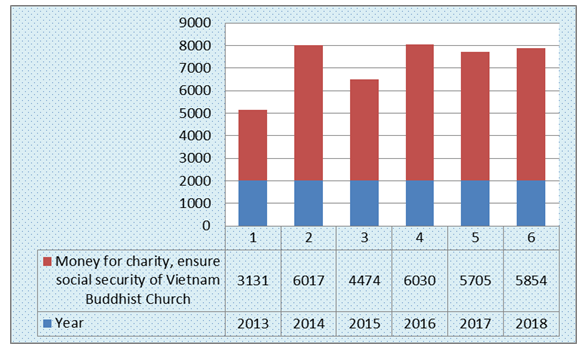 | Diagram 1. Money for charity, ensure social security of Vietnam Buddhist Church (Source: The authors compiled statistics from Vietnamese Buddhist Association reports from 2013 to 2018) |
|
4. Discuss Research Results
- Nearly 40 years of reunification and development, with the spirit of “loving-kindness”, “compassion”, “empathetic joy”, “equanimity” towards goodness of monks, nuns and buddhists throughout the country, therefore, the activities to ensure social security of the Vietnam Buddhist Sangha have achieved a number of positive achievements, making significant contributions to the country's sustainable development:On the basis of guidelines and policies of the Government of Vietnam, the Vietnam Buddhist Sangha always promulgate promptly and creatively apply guidelines and measures to ensure social security for Buddhists and people. Many social security programs have been implemented quickly and timely to help fellow Buddhists and people in areas hit by natural disasters, floods, and unusual accidents. At the same time, the Sangha’s departments have successfully organized scientific seminars on the basic pillars of social security policies to gain experiences and come up with solutions suitable to practical requirements;On the basis of guidelines and policies of the Government of Vietnam, the Vietnam Buddhist Sangha always promulgate promptly and creatively apply guidelines and measures to ensure social security for Buddhists and people. Many social security programs have been implemented quickly and timely to help fellow Buddhists and people in areas hit by natural disasters, floods, and unusual accidents. Research results from the survey showed that the local Buddhist Sangha of Vietnam implemented well the guidelines and policies with a relatively high percentage such as Hanoi Capital: 84.2%; Ho Chi Minh City: 87.3%; Hung Yen province: 82.9%; Ba Ria - Vung Tau province: 78.6%; etc. At the same time, the Sangha's committees successfully organized scientific seminars under the basic pillars of social security policies to gain experience and work out solutions in accordance with requirements set out in practice;
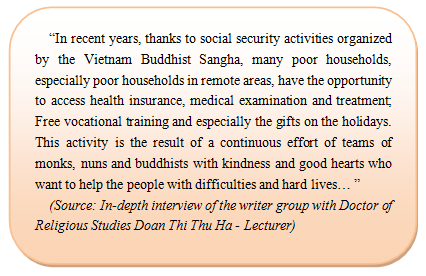 The organization and management structure of social charity activities of the Vietnam Buddhist Sangha is being completed everyday in a flexible and modern way. Social Charity Committee is set up from the Central to provinces and cities. The Committee has attracted the attention and participation of the prestigious monks in the Sangha and the laities, the sponsors (businesses, businessmen with good hearts). Survey results show that the majority of votes said that the contingent of monks and nuns in the localities performed well and very well their role when participating in the implementation of social security policies: Hanoi capital: 54.2%; Ho Chi Minh City: 43.8%; Hung Yen province: 43.1%; Dien Bien: 34.8%; ...Therefore, charitable movements launched by the Sangha have always been actively deployed.
The organization and management structure of social charity activities of the Vietnam Buddhist Sangha is being completed everyday in a flexible and modern way. Social Charity Committee is set up from the Central to provinces and cities. The Committee has attracted the attention and participation of the prestigious monks in the Sangha and the laities, the sponsors (businesses, businessmen with good hearts). Survey results show that the majority of votes said that the contingent of monks and nuns in the localities performed well and very well their role when participating in the implementation of social security policies: Hanoi capital: 54.2%; Ho Chi Minh City: 43.8%; Hung Yen province: 43.1%; Dien Bien: 34.8%; ...Therefore, charitable movements launched by the Sangha have always been actively deployed.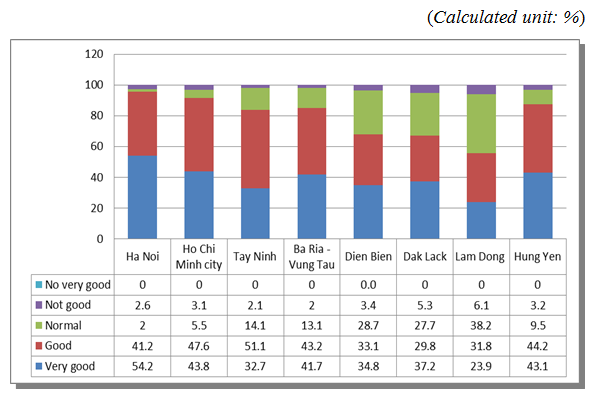 | Diagram 4. Assessment of people engagement on the policy for social welfare for the sangha recently (Source: survey of the authors in some localities in Vietnam, 2019) |
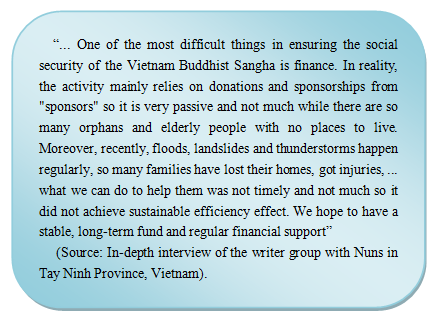
5. Experience Obtained from Social Security Assuring Activities for People of the Vietnam Buddhist Sanha from 1981 to Now
- To eradicate suffering and to be liberated peacefuly requires monks, nuns and buddhists to perform the Noble Eightfold Path11. The path to end suffering is also the awakening of monks, nuns, Buddhists before the temptation of greed, hatred and delusion. One of the effective and quick measures to " eradicate suffering" requires monks, nuns and followers to make vows and actions that come from "Mind". Consciousness and work are all towards building a good life for all people throughout the human race.With the goal: "Intelligence - Discipline - Integration - Development" of the Eighth Congress of Delegates of the Vietnam Buddhist Sangha (2017), Vietnamese Buddhism continues to promote collective intelligence, high spirit of solidarity and harmony in successfully implementing the tasks set out by the Sangha, in which focusing on effective implementation of activities to ensure social security for buddhists and people. Therefore, based on the assessment of the situation and discussion of research results, the writers group draw some experience from the Sangha’s social security assuring activities from 1981 to now. This is also the initial experience to help the Sangha continue to promote its positives and reduce the limitations to further promote social security assuring activities for buddhists and people in the future.1. To see the importance of the propaganda of guidelines, policies and laws on social security policies, the importance of activities to ensure social security in the process of innovation and international integration. Propaganda of the Buddhist Sangha should focus on each specific area of the social security policy (preferential policies for people with meritorious services to the country; policies to create jobs for young people in rural areas; social support and relief in Some localities that are often or unexpectedly exposed to natural disasters; ...). In addition, the propaganda should have a good example of positive and typical collectives and individuals when participating in social security assuring activities organized by the Vietnam Buddhist Sangha at the central and locals. The propaganda must be promptly transmitted through media (newspapers, internet, radio, television ...) or organize a meeting to talk about the experience of participating in activities to ensure social security of monks, nuns and buddhists, avoid perfunctory organization.2. To see the importance of the professional perfection of the contingent of monks, nuns and buddhists in the Social Charity Committee, the Economic and Financial Committee and the Information and Communications Committee. The Sangha needs to combine with some training institutions to open specialized thematic classes to provide knowledge, skills on social security assurance: social protection; social assistance; lonely old people and orphans; policies for sustainable poverty reduction; creating jobs for workers; ... Through training courses to help the monks, nuns and Buddhists in the Committees, especially the Social Charity Committee, formulate skills when approaching and deploying charity programs implemented by the Sangha. In addition, the Sangha needs to strengthen training in integration skills, exchange of experiences and receive the help of Buddhism in countries, in the region and the world.3. Build plans and bring out specific solutions suitable to each locality in order to mobilize financial resources for the Sangha's social security assuring activities. Financial resources must be mobilized from many sources but must towards sustainability. The Sangha should proactively coordinate with relevant ministries, departments, branches and socio-political organizations in building economic and production establishments in order to create jobs for disadvantaged people in society (focus on activities that have been implemented effectively and positively, such as helping Buddhists and people who got infected with HIV / AIDS; ...). Gradually create income for beneficiaries of social security policies, operating funds for social charity committees and others in the localities. In addition, the Sangha extends information to buddhists overseas, calling them to "support" the activities of social security policies, especially the lonely old people, orphans.4. Monks, nuns and Buddhists are always engaged in the path of "saving the suffering" to use the financial resources and other resources to help ensure social security quickly and effectively. The Sangha needs to develop specific programs and measures when participating in the schemes in the projects to ensure social security. Such construction should be coordinated with other socio-political organizations in order to avoid wasteful or inadequate investment and focus appropriate to each object and area: mountainous areas need to expand the model of "meals of love"; allocating and providing free medical examination and treatment for ethnic minorities; building many boarding schools for children in remote areas of the country; In rural areas, it is necessary to support employment for young people; participate in educating and guilding kindness to young people who are caught in social evils; Large cities should focus on philanthropic activities and education about the ideal of living, start-up spirit for youth and students.
6. Conclusions
- The doctrine or law of Buddhism is the basis and foundation for building and developing the world of peace and happiness with harmony, wisdom, care, embrace and sharing of its members in social. It can be seen that desire is the source of all suffering and war, poverty is the cause of immorality and crimes such as theft, lie, violence, hatred, cruelty.... [9]. Recognizing the importance of ensuring social security for the sustainable development of the country and the tradition of "for the contry, for the people" for thousands of years, the Vietnam Buddhist Sangha constantly cares for the weaks in society. That spirit and action that have proved the spirit of Buddhism's reincarnation "good for the country, good for life". Ensuring social security for people is the beginning of "compassionate heart", the humanistic value of Buddhism is growing and spreading to all classes of people. This is also an affirmation of the position, role and responsibility of Buddhism in religious practice, helping life in the context of Vietnam being in the process of innovation, development and integration.
Notes
- 1. The MDGs (8 MDGs) include: 1. To eradicate extreme poverty and hunger. 2. To achieve universal primary education. 3. To promote gender equality and empower women. 4. To reduce child mortality. 5. To improve maternal health. 6. To combat HIV/AIDS, malaria, and other diseases. 7. To ensure environmental sustainability. 8. To develop a global partnership for development.2. Buddhism Research Institution (1993), Saṃyutta Nikāya (Volume 1) tr.234.3. Unconditional Love is love without hesitation, with motivation (predestination). From inside (like a lonely, empty mood wanting to be your friend for grief), or outside, like when you see an "eye-catching" person. Unconditional Love is natural love, no condition, no cause, not a phase emotion, an inner (inner) feeling or an external stimulus, a permanent love in it there is not the subject "love" and the object "be loved", completely absent from the "I" in it.4. Universal Love also calls Universal Compassion. Visualizing all sentient beings is the same nature that arises the mind of compassion and equality to save suffering and to give joy. The Bodhisattva of the Land or above, considering sentient beings as oneself, taking the suffering of sentient beings as his own suffering, generating mercy.5. It is only for everything in the universe that they are in harmony, coexisting together. That is, human beings are resident animals (living together), regardless of whether they eat, wear, live or go - the things that they receive daily are the fruits of mutual interaction. Especially with the modernity of the mass media, people can not leave the masses to live alone. (See the article "Ethics of Buddhism", published in Tinhvan's Buddhist and secular works, . Shanghai Publisher, 2008, p.103).6. Central Social Voluntary Board (2017), Final report on Buddha work tenure VII (2012 -2017) Central Social Voluntary Board Buddhists Sangha of Vietnam, Hồ Chí Minh City, October 21st 2017.7. Nguyễn Minh Ngọc (2014), “Some details about social volunteer work of the religions in Vietnam today”, Buddhism research magazine” no. (3).8. Central Asia (2017), Prevent, response to HIV/AIDS – Determination achallenge, , December 29th 2017.9. Huệ Năng (Năng, zh. huìnéng/ hui-neng 慧能, ja. enō), 638-713, at Tân Châu, Lãnh Nam region. When he was born, there were two monks visting giving him his name Huệ Tăng. He attained awakening before leaving home, is the Sixth Ancestor of Zen, disciple and successor of the Fifth Ancestor Hoằng Nhẫn.10. According to Master Nguyễn Hoàng Long, Chief Officer Prevent, response to HIV/AIDS (Medical Department), if 90% of the people know their HIV infection, the work on supervising and testing have been done well; if 90% of HIV patients is treated continuously with ARV, then we have done the treatment well, taking part in reducing the chance of infecting HIV for the community and from mother to child; if 90% people is treated by ARV control their virus number at low and stable, then number of HIV viruses is in the low under the seeable is an important stat in judging the quality of treatment and the obedience to treatment by patient. Therefore, if we achieve 90 – 90 – 90 then we can achieve the goal to end AIDS in 2030 just as the UN showed.11. The Noble Eightfold Path includes: Right View, Right Resolve, Right Speech, Right Conduct, Right Livelihood, Right Effort, Right Mindfulness, Right Samadhi.
 Abstract
Abstract Reference
Reference Full-Text PDF
Full-Text PDF Full-text HTML
Full-text HTML